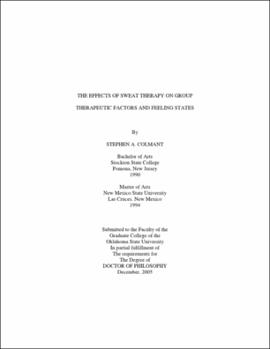| dc.contributor.advisor | Winterowd, Carrie | |
| dc.contributor.author | Colmant, Stephen A. | |
| dc.date.accessioned | 2013-11-26T08:34:19Z | |
| dc.date.available | 2013-11-26T08:34:19Z | |
| dc.date.issued | 2005-12 | |
| dc.identifier.uri | https://hdl.handle.net/11244/7353 | |
| dc.description.abstract | Scope and Method of Study: Sweat therapy is the combination of intense heat exposure with psychotherapy or counseling. The primary purpose of this study was to examine the efficacy of sweat therapy as a group counseling technique by investigating the effects of sweat therapy on group therapeutic factors with a group of college students. The second purpose of this study was to explore the effects of sweat and non-sweat group counseling conditions on feeling states to investigate one aspect of how group sweating functions. Eighty-five university students were randomly assigned to one of two conditions: (a) Sweat group: Group counseling in a sauna; or, (b) Non-sweat group: Group counseling in a standard office setting. The groups met weekly for six sessions. Measures used included an informed consent form, an intake form, the Critical Incidents Questionnaire (CIQ), the Therapeutic Factor inventory (TFI), the Exercise Induced Feeling Inventory (EFI)and the Subjective Exercise Experiences Scale (SEES). | |
| dc.description.abstract | Findings and Conclusions: Overall, the sweat therapy groups appeared to have greater therapeutic quality compared to the non-sweat groups as measured by direct and indirect assessment of participants' perceptions of their experience and by practical variables. Sweat therapy group participants perceived a greater availability of therapeutic factors, reported sessions to be more useful, and had less absenteeism and group dropouts than non-sweat group counseling participants. Secondly, participants in these two conditions appeared to differ with regard to their feeling states of fatigue, revitalization, and physical exhaustion two-hours following the group intervention. In particular, sweat participants, on average, felt less fatigued, more revitalized, and less physically exhausted two hours following the group experience compared to non-sweat participants. The results of this study provide empirical support for the theory that sweat therapy enhances the quality of group process and is a useful medium for group work. This study also adds to our understanding of how group sweating operates by specifically implicating improved feeling states lasting several hours. Implications for future research are discussed. | |
| dc.format | application/pdf | |
| dc.language | en_US | |
| dc.rights | Copyright is held by the author who has granted the Oklahoma State University Library the non-exclusive right to share this material in its institutional repository. Contact Digital Library Services at lib-dls@okstate.edu or 405-744-9161 for the permission policy on the use, reproduction or distribution of this material. | |
| dc.title | Effects of sweat therapy on group therapeutic factors and feeling states | |
| dc.contributor.committeeMember | Cashel, Chris | |
| dc.contributor.committeeMember | Fuqua, Dale | |
| dc.contributor.committeeMember | Boswell, Don | |
| osu.filename | Colmant_okstate_0664D_1543.pdf | |
| osu.accesstype | Open Access | |
| dc.type.genre | Dissertation | |
| dc.type.material | Text | |
| thesis.degree.discipline | Educational Psychology | |
| thesis.degree.grantor | Oklahoma State University | |
